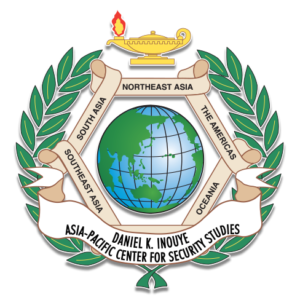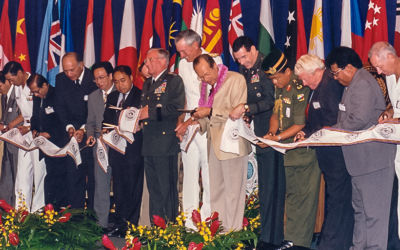The Daniel K. Inouye Asia-Pacific Center for Security Studies (DKI APCSS) is a U.S. Department of Defense institute that officially opened Sept. 4, 1995, in Honolulu, Hawaii. DKI APCSS addresses regional and global security issues, inviting military and civilian representatives of the United States and Asia-Pacific nations to its comprehensive program of executive education and workshops, both in Hawaii and throughout the Indo-Pacific region.
The Center supports the U.S. Indo-Pacific Command’s objective of developing professional and personal ties among national security establishments throughout the region. With a non-warfighting mission, the Center focuses on a multilateral and multi-dimensional approach to defining and addressing regional security issues and concerns. The most beneficial result is building relationships of trust and confidence among future leaders and decision-makers within the region.
DKI APCSS provides a focal point where national officials, decision makers and policy makers can gather to exchange ideas, explore pressing issues and achieve a greater understanding of the challenges that shape the security environment of the Indo-Pacific region. As well, the Center gives attention to the increasingly complex interrelationships of military, economic, political and diplomatic policies relevant to regional security issues through its three academic components: executive education, workshops and research and publications efforts.
Vision:
A free, prosperous Indo-Pacific promoting collaborative, inclusive security.
Mission:
DKI APCSS builds resilient capacity, shared understanding, and networked relationships among civilian and military practitioners and institutions to advance a free and open Indo-Pacific.
Guiding Principles:
- Transparency: Foster an environment that encourages open and honest communication and processes.
- Mutual Respect: Value perspectives that are different from our own.
- Inclusion: Seek to involve the broadest range of stakeholders and ideas.
Our Approach
In support of the U.S. Department of Defense, and as a mission partner of U.S. Pacific Command, DKI APCSS will cultivate and maintain security networks that reinforce the rules-based international order. To this end, we will:
- Implement our mission through executive education that is practitioner-centric, activity-based, and technology-enabled.
- Facilitate the free exchange of ideas among security professionals and strengthen a conflict prevention framework.
- Address security comprehensively with a lens on traditional and non-traditional issues, opportunities, and challenges.
- Create inclusive, shared learning experiences through well-crafted programs and expert facilitation.
- Value knowledge, networks, and leadership tools as cooperation enablers.
- Build human capital as the means to produce policies and strategic plans for effective and accountable security sectors and institutions.
- Foster networks centered on our alumni as well as partnerships with educational institutions.
Our Distinct Value
DKI APCSS is recognized and respected for delivering practical outcomes that enhance security sector capacity and cooperation
History
On Sept. 30, 1994, President Clinton signed H.R. 4650, which included $3 million for the start-up of the Daniel K. Inouye Asia-Pacific Center for Security Studies, patterned after the George C. Marshall European Center for Security Studies. The Center officially opened on Sept. 4, 1995, with a ribbon-cutting ceremony attended by the Honorable William J. Perry, then-Secretary of Defense and General John M. Shalikashvili, then Chairman of the U.S. Joint Chiefs of Staff. Also, 90 attendees from 33 countries participated, including several ministers of defense and key international representatives. The Center was created to build on the strong bilateral relationships between the U.S. Indo-Pacific Command and the armed forces of the nations in the Asia-Pacific region, by focusing on the broader multilateral approach to addressing regional security issues and concerns.
 Seal
Seal
The Lamp of Knowledge represents the academic focus of the Center and signifies the desire to foster understanding, cooperation and the study of regional security issues. The laurel branches form a Wreath of Peace that emphasize the Center’s non-warfighting approach to addressing regional security issues. The visible portion of the world globe depicts the U.S. Indo-Pacific Command’s area of responsibility. The continuous ribbon symbolizes the strong interrelationship among the five geographic regions of the Indo-pacific. (This seal was conceptualized by Dr. Jimmie R. Lackey, who was then an Army colonel, and is a former DKI APCSS executive director).
Website note: We recognize the proper use of the Hawaiian language including the ‘okina [‘], a glottal stop, and the kahakō [ō] or macron (e.g., in place names of Hawai‘i such as Lāna‘i). However, these have been omitted from this website for the best online experience for our visitors. We realize the importance and continue to use them outside of the online platform.






